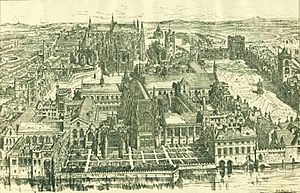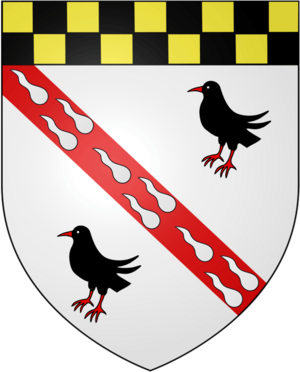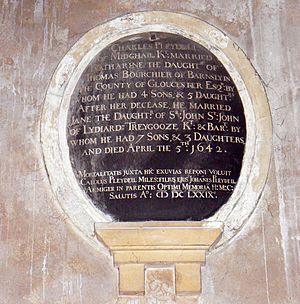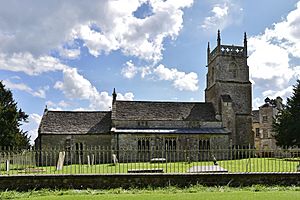Gabriel Pleydell facts for kids
Gabriel Pleydell (lived around 1519–1591) was an English landowner and politician. He lived at Midg Hall in Lydiard Tregoze, Wiltshire. Gabriel served as a Member of Parliament for areas like Wootton Bassett and Marlborough.
Gabriel was born before 1519 into a large, well-off family. He started his political career in 1553 as an MP for Wootton Bassett. This town was close to his family's home at Midgehall. Two years later, he became an MP for Marlborough. This was likely thanks to his father's important connections. In 1563, he returned to the Wootton Bassett seat. This happened because Sir John Thynne asked him to. Gabriel had supported Thynne in a disagreement earlier.
Gabriel Pleydell's life, both in politics and personally, often involved legal problems. He was almost always the one being sued in court. Some accusations against him included forcing people out of their homes. He was also accused of taking things from private property. People said he protected criminals and made fake documents. He was even accused of illegal hunting. In 1555, he was found guilty of being part of a plan to remove Queen Mary of England. He then famously claimed parliamentary privilege, which caused a big argument between the House of Commons and the House of Lords. He was even sent to Fleet Prison and the Tower of London. A historian said these legal issues helped Gabriel Pleydell become known in parliamentary history. He passed away between December 1590 and February 1591.
Contents
Early Life and Family History
Gabriel Pleydell was born by 1519. He was the sixth of nine children and the fourth son. His father, William Pleydell, was a rich farmer from Coleshill. His mother was Agnes Reason. Gabriel's younger brother, John Pleydell, also became a Member of Parliament. The Pleydell family was thought to be related to Thomas de Coleshill. He was a knight who received land from King Edward I in 1275.
By 1540, Gabriel was an adult. He owned land near Cricklade. In 1534, Gabriel's father, William, leased the Midgehall estate for 95 years. This was from the Abbot of Stanley Abbey. Records from 1545 show Gabriel was managing Midgehall's money. He had to pay money to King Henry VIII. In 1549, his father gave him the lease for a manor house. In 1553, he got a sublease for the Midgehall estate.
William Pleydell died in 1555. He left the Midgehall lease to his wife, Agnes. When Agnes died in 1567, Gabriel tried to challenge her will. He didn't succeed, and this caused problems with his brother John. Gabriel still inherited the estate. His father had first planned for his older brothers, Virgil and Tobias, to own the estate. But Virgil died around 1559. By 1567, Tobias had lived in Chipping Faringdon for 11 years. So, he gave up his right to the inheritance.
Family and Descendants
Gabriel Pleydell married Anne Stockes. She was the daughter of Henry Stockes from Sussex. They had two children who lived to adulthood:
- Oliver Pleydell: He married a woman from Gloucestershire first. They had one son, Sir Charles Pleydell. Sir Charles married Katharine Bouchier and they had nine children. Oliver then married Jane St. John. She was the daughter of Sir John St. John, who was an MP for Bedfordshire. Oliver and Jane had ten more children.
- Agnes Pleydell: She married William Bayly. He was a lawyer and an MP for Chippenham. He was also the Undersheriff of Wiltshire. Agnes and William had seven children. Their sons included Henry Bayly and John Bayly, who both became Members of Parliament.
Later Family Members
Gabriel is an important ancestor of the Pleydell family who lived in Milborne St Andrew and later Whatcombe, both in Dorset. This family line included Edmund Morton Pleydell. He was an MP for Dorchester and Dorset. His father, Edmund Pleydell, was also an MP for Wootton Bassett.
Political Career

Gabriel Pleydell first became a Member of Parliament in March 1553. He represented the town of Wootton Bassett. His wealth and land ownership helped him get this position. Even though he hadn't fully inherited the Midgehall estate yet, he bought land nearby. This showed he had enough money to get a seat in the House of Commons. The Wootton Bassett constituency no longer exists today. Records show that Gabriel was known by his first name alone. This was because it was quite unusual. He served with William Garrard for only 30 days before Parliament was closed.
His election for Marlborough in 1555 was similar. But it relied more on his important connections. Gabriel's father had leased land from Thomas Seymour nearby. This created a trusting relationship between the families. After Seymour's brother was executed, his wife, Anne, took over the estates. The Duchess made Gabriel the chief ranger of Savernake Forest before 1554. He also became her main financial manager that year. Being a ranger likely helped him get property in Chippenham. His land ownership helped him become the MP for Marlborough. Gabriel served with Sir Andrew Baynton.
Pleydell returned as an MP for Wootton Bassett in 1563. This was possible because of Sir John Thynne. Thynne was a very important person in Wiltshire politics. Gabriel had supported Thynne in a contest in 1559. This certainly helped him get chosen for Parliament. Gabriel served with Matthew Poyntz until 1567.
Legal Challenges
Gabriel Pleydell's time in Parliament was full of legal problems. He was usually the one being sued. But he also sued others in at least three cases. Once, he sued several men who forced him out of a manor house he was renting. He also had a dispute with his brother Tobias over the Midgehall estate. Another time, he sued his son's father-in-law, Sir John St. John. Gabriel claimed Midgehall had certain rights to use pastures on St. John's land.
One serious accusation against Gabriel was about forcing someone out of a manor house in East Grafton in 1553. He was accused of helping someone else and trying to set up a friendly jury. Both were found innocent. They said they were acting on behalf of their employer, Anne Seymour. Around the same time, Gabriel was sued for entering and taking property illegally. He claimed he was acting because the owner didn't pay rent on time.
Parliamentary Privilege Dispute
Gabriel Pleydell was a Protestant. He was described as a "religious and political radical" during Queen Mary's reign. In 1555, he voted against a government bill. This, along with his past issues, might have led to him being sent to the famous Fleet Prison. Gabriel was a strong supporter of Sir Anthony Kingston. He became linked to a plan by Sir Henry Dudley to remove Queen Mary. This plan also aimed to make Queen Elizabeth the next ruler.
The court accused Gabriel of causing riots against Queen Mary. He was seen as a "ringleader" of this plan. When the court found him guilty in 1555, he claimed parliamentary privilege. This meant he believed he was protected from arrest while Parliament was meeting. The House of Commons agreed that his privilege had been broken. They sent a group to the House of Lords to support his immunity.
However, legal experts said that Gabriel's privilege had not been broken. They said the charges against him would continue. The Commons were not happy with this decision. They refused to allow more action against Gabriel until Parliament closed a few days later. Gabriel was released from prison in December 1555. He had to pay a large amount of money to the crown. His freedom depended on him returning to court later, which he did. When he was released, Gabriel told the Privy Council that he was punished for "speaking his conscience." The court thought his comments were insulting, but it's not clear if he faced more legal action for them.
Protecting Others and Property Disputes
In 1557, Gabriel was accused of protecting two people who had committed crimes. These men were his servants. They worked for him as chief ranger of Savernake Forest. The person accusing him was a former associate, John Berwick. Berwick was likely jealous and had a dispute with Gabriel over land near the forest. Gabriel got help from other Members of Parliament to examine witnesses and evidence. The court saw Gabriel's actions as trying to weaken the Queen's justice system. This, along with not meeting regularly with the Privy Council as he promised, led to him being charged. Gabriel was sent to the Tower of London. He lost the money he had paid for his release earlier. He was released in December for good behavior. He had to pay an even larger amount of money this time.
Accusations of Forgery
Gabriel Pleydell faced several accusations of making fake documents. One important case was brought by Francis Newdigate in 1563. At this time, Gabriel was in a lot of debt. Newdigate was the second husband of Anne Seymour, Gabriel's employer. He accused Gabriel of forgery related to a manor he had leased. The details are not clear. But Newdigate brought the case to the House of Commons. A committee was formed to investigate. This committee, which included important legal officials, had "great and strong suspicion" of Gabriel. Gabriel read their report and responded to it. The House ordered that copies of the documents be given to both sides. No further mention of the case is found after that.
Later, Sir Andrew Baynton, who had served as an MP with Gabriel, faced financial problems. He temporarily gave his lands to Thomas Seymour. When Seymour was executed, the lands went to the crown. Queen Mary sold them to several people, including Gabriel Pleydell. Gabriel acquired manor houses in 1562. It is believed that Gabriel went further to get Baynton's estates. He and Henry Sharington were supposed to manage Baynton's will after he died in 1564. They took Baynton's properties for themselves. This was against Baynton's wishes to leave them to his brother, Edward. Historians have called Gabriel and Sharington "unscrupulous." This action "confirms Gabriel Pleydell a niche in parliamentary history," but it also "detracts still further from his reputation."
Gabriel later gave up any rights to these estates to Edward Baynton in 1566. The Privy Council then rejected the forgery accusations against him. Edward had long suspected Gabriel and Sharington. He had even tried to sue them for forgery earlier. He also ordered an attack on Gabriel's servants.
In 1564, Gabriel, his supporter Sir John Thynne, and others were charged. Gabriel was sent back to Fleet Prison for illegal hunting. He was allowed to leave under guard to attend important lawsuits against him. These were likely related to the Baynton family's forgery case. Years later, he was accused of similar offenses again. The prosecution called Gabriel and his helpers "persons of long time acquainted with such bad plans and practices."
Death and Will
Gabriel Pleydell wrote his will on December 19, 1590. He was "sick in body." A document from February 3, 1591, shows he died between these two dates. His wife received ten cows and 100 sheep, worth about £60. She also got half of his personal belongings and household goods at the Midgehall estate. Each of his servants and his burial place, St Mary's Church in Lydiard Tregoze, received 10 shillings. The poor people of the parish received 20 shillings.
The money from some of Gabriel's lands was given to his political friends. These included Sir Charles Danvers, Sir John Danvers, Sir John St. John, and Sir Edward Baynton. It was hoped that Gabriel's grandson Charles, who was still a child, would inherit a lot of money. The rest of his wealth went to Agnes, his only daughter. She was in charge of carrying out the will. She paid the people who oversaw the document, Richard Danvers and Gabriel's nephew Robert Wells, 20 shillings for their help.
 | Anna J. Cooper |
 | Mary McLeod Bethune |
 | Lillie Mae Bradford |





